Detailed Report: Evolution of Management Theory and Practice Analysis
VerifiedAdded on 2023/01/13
|8
|2385
|24
Report
AI Summary
This report provides a comprehensive overview of the evolution of management theory and practice, beginning with the Industrial Revolution and extending to modern management approaches. It examines the shift from pre-industrial methods to the emergence of scientific management, administrative management, and human relations theories. The report explores key concepts such as the impact of technology, the rise of factories, and the changing dynamics between employers and employees. It also discusses various management theories, including the General System Theory and McGregor's X and Y Theory, highlighting their influence on organizational development, leadership styles, and workplace environments. The conclusion emphasizes the significance of these theories in shaping modern management principles and practices, including the importance of employee training, relationship building, and the creation of a positive and productive work environment.
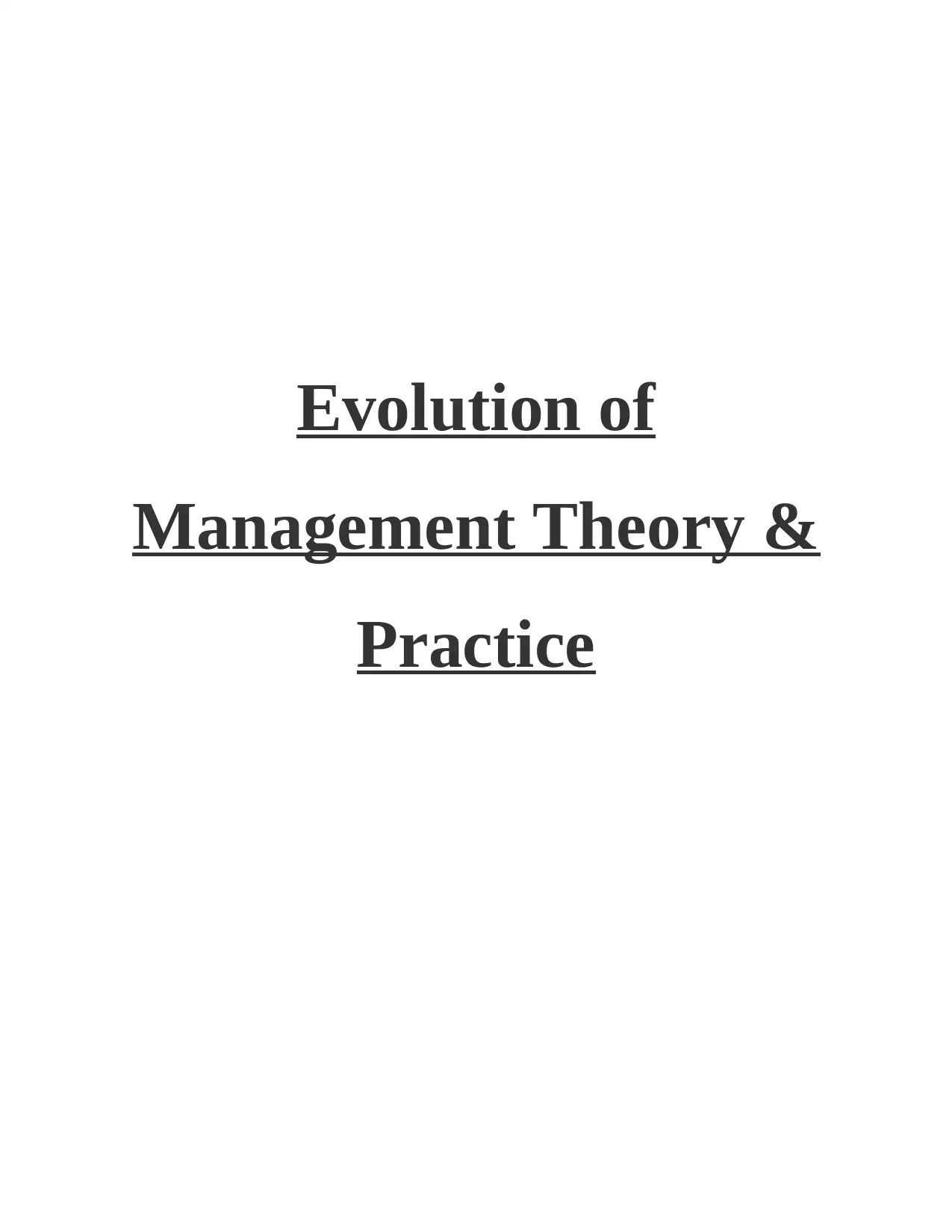
Evolution of
Management Theory &
Practice
Management Theory &
Practice
Paraphrase This Document
Need a fresh take? Get an instant paraphrase of this document with our AI Paraphraser
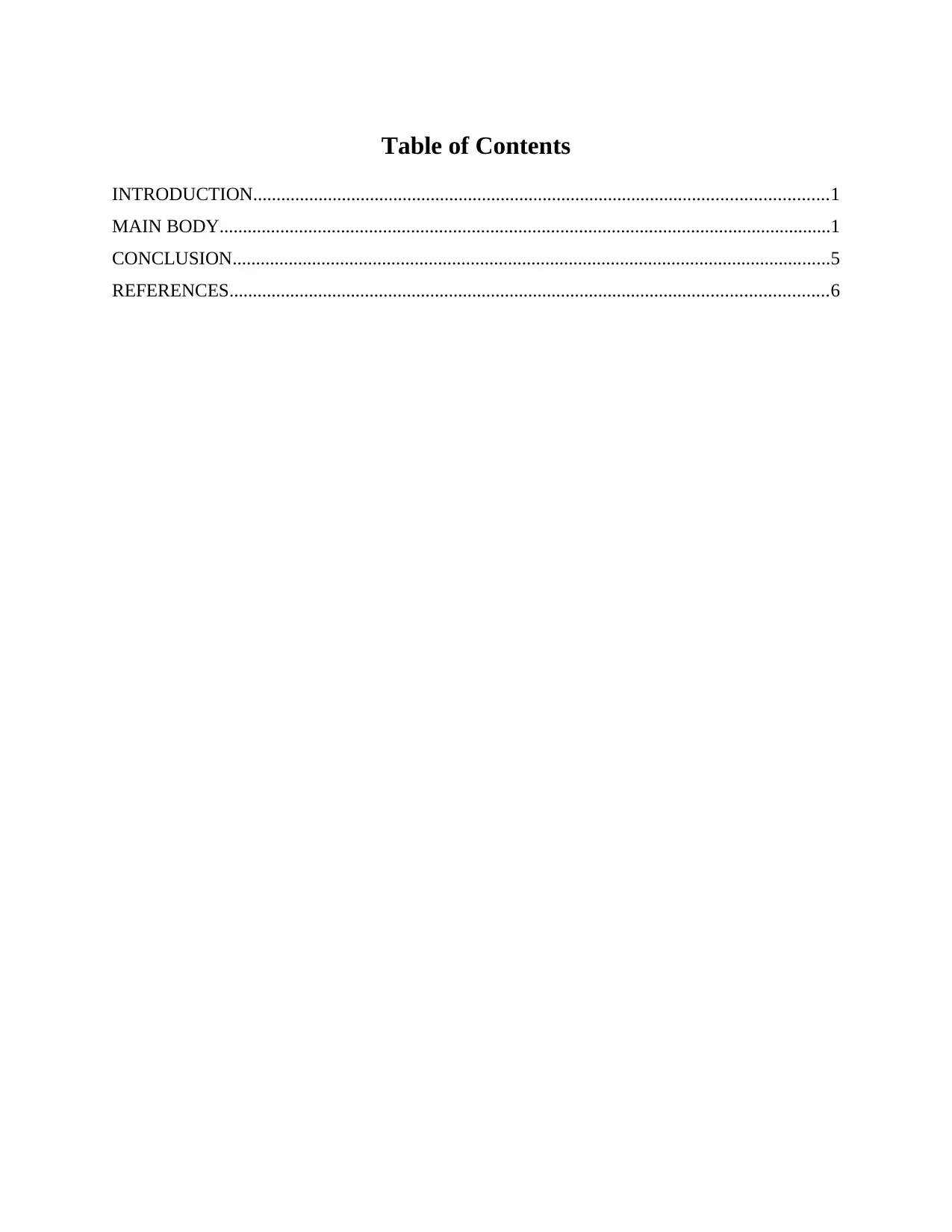
Table of Contents
INTRODUCTION...........................................................................................................................1
MAIN BODY...................................................................................................................................1
CONCLUSION................................................................................................................................5
REFERENCES................................................................................................................................6
INTRODUCTION...........................................................................................................................1
MAIN BODY...................................................................................................................................1
CONCLUSION................................................................................................................................5
REFERENCES................................................................................................................................6
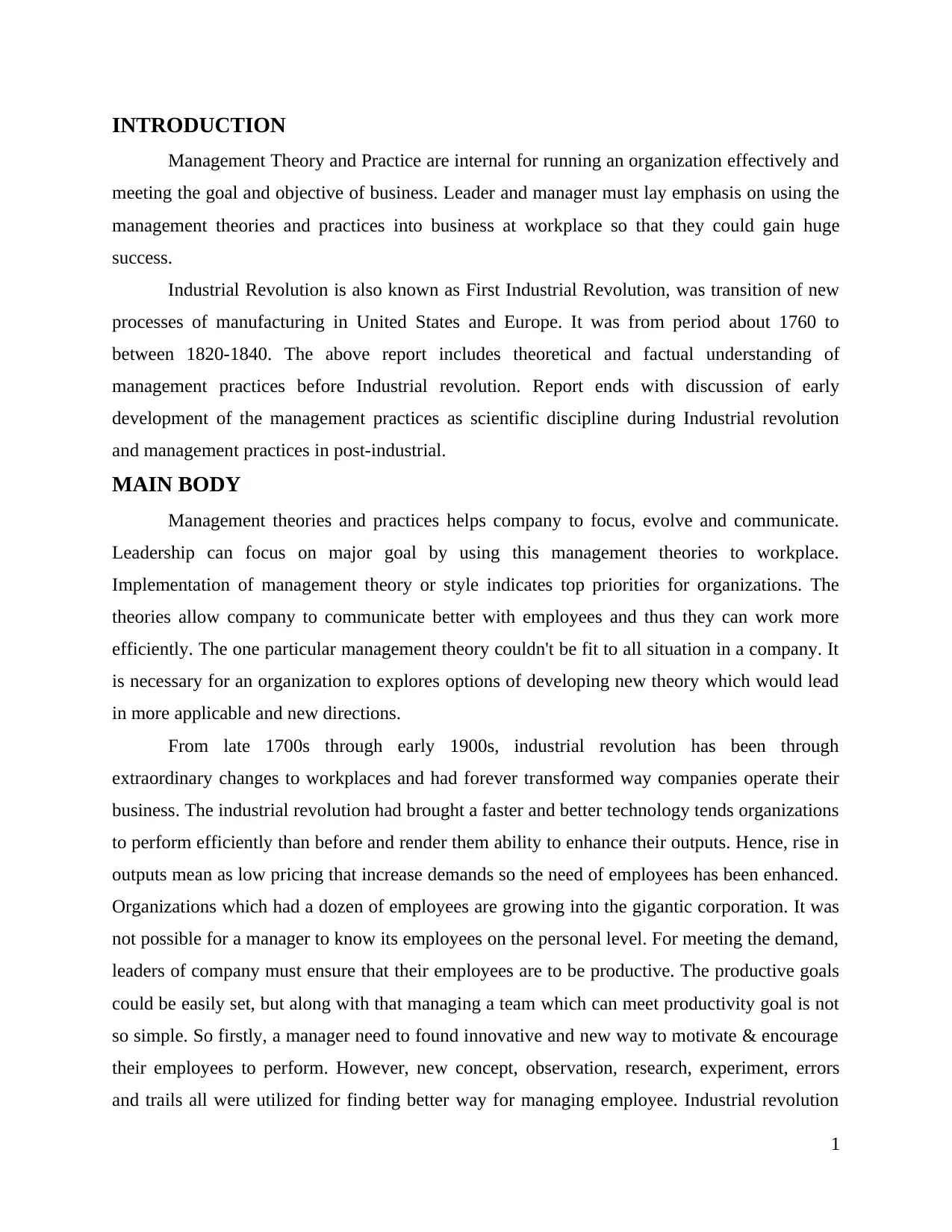
INTRODUCTION
Management Theory and Practice are internal for running an organization effectively and
meeting the goal and objective of business. Leader and manager must lay emphasis on using the
management theories and practices into business at workplace so that they could gain huge
success.
Industrial Revolution is also known as First Industrial Revolution, was transition of new
processes of manufacturing in United States and Europe. It was from period about 1760 to
between 1820-1840. The above report includes theoretical and factual understanding of
management practices before Industrial revolution. Report ends with discussion of early
development of the management practices as scientific discipline during Industrial revolution
and management practices in post-industrial.
MAIN BODY
Management theories and practices helps company to focus, evolve and communicate.
Leadership can focus on major goal by using this management theories to workplace.
Implementation of management theory or style indicates top priorities for organizations. The
theories allow company to communicate better with employees and thus they can work more
efficiently. The one particular management theory couldn't be fit to all situation in a company. It
is necessary for an organization to explores options of developing new theory which would lead
in more applicable and new directions.
From late 1700s through early 1900s, industrial revolution has been through
extraordinary changes to workplaces and had forever transformed way companies operate their
business. The industrial revolution had brought a faster and better technology tends organizations
to perform efficiently than before and render them ability to enhance their outputs. Hence, rise in
outputs mean as low pricing that increase demands so the need of employees has been enhanced.
Organizations which had a dozen of employees are growing into the gigantic corporation. It was
not possible for a manager to know its employees on the personal level. For meeting the demand,
leaders of company must ensure that their employees are to be productive. The productive goals
could be easily set, but along with that managing a team which can meet productivity goal is not
so simple. So firstly, a manager need to found innovative and new way to motivate & encourage
their employees to perform. However, new concept, observation, research, experiment, errors
and trails all were utilized for finding better way for managing employee. Industrial revolution
1
Management Theory and Practice are internal for running an organization effectively and
meeting the goal and objective of business. Leader and manager must lay emphasis on using the
management theories and practices into business at workplace so that they could gain huge
success.
Industrial Revolution is also known as First Industrial Revolution, was transition of new
processes of manufacturing in United States and Europe. It was from period about 1760 to
between 1820-1840. The above report includes theoretical and factual understanding of
management practices before Industrial revolution. Report ends with discussion of early
development of the management practices as scientific discipline during Industrial revolution
and management practices in post-industrial.
MAIN BODY
Management theories and practices helps company to focus, evolve and communicate.
Leadership can focus on major goal by using this management theories to workplace.
Implementation of management theory or style indicates top priorities for organizations. The
theories allow company to communicate better with employees and thus they can work more
efficiently. The one particular management theory couldn't be fit to all situation in a company. It
is necessary for an organization to explores options of developing new theory which would lead
in more applicable and new directions.
From late 1700s through early 1900s, industrial revolution has been through
extraordinary changes to workplaces and had forever transformed way companies operate their
business. The industrial revolution had brought a faster and better technology tends organizations
to perform efficiently than before and render them ability to enhance their outputs. Hence, rise in
outputs mean as low pricing that increase demands so the need of employees has been enhanced.
Organizations which had a dozen of employees are growing into the gigantic corporation. It was
not possible for a manager to know its employees on the personal level. For meeting the demand,
leaders of company must ensure that their employees are to be productive. The productive goals
could be easily set, but along with that managing a team which can meet productivity goal is not
so simple. So firstly, a manager need to found innovative and new way to motivate & encourage
their employees to perform. However, new concept, observation, research, experiment, errors
and trails all were utilized for finding better way for managing employee. Industrial revolution
1
⊘ This is a preview!⊘
Do you want full access?
Subscribe today to unlock all pages.

Trusted by 1+ million students worldwide
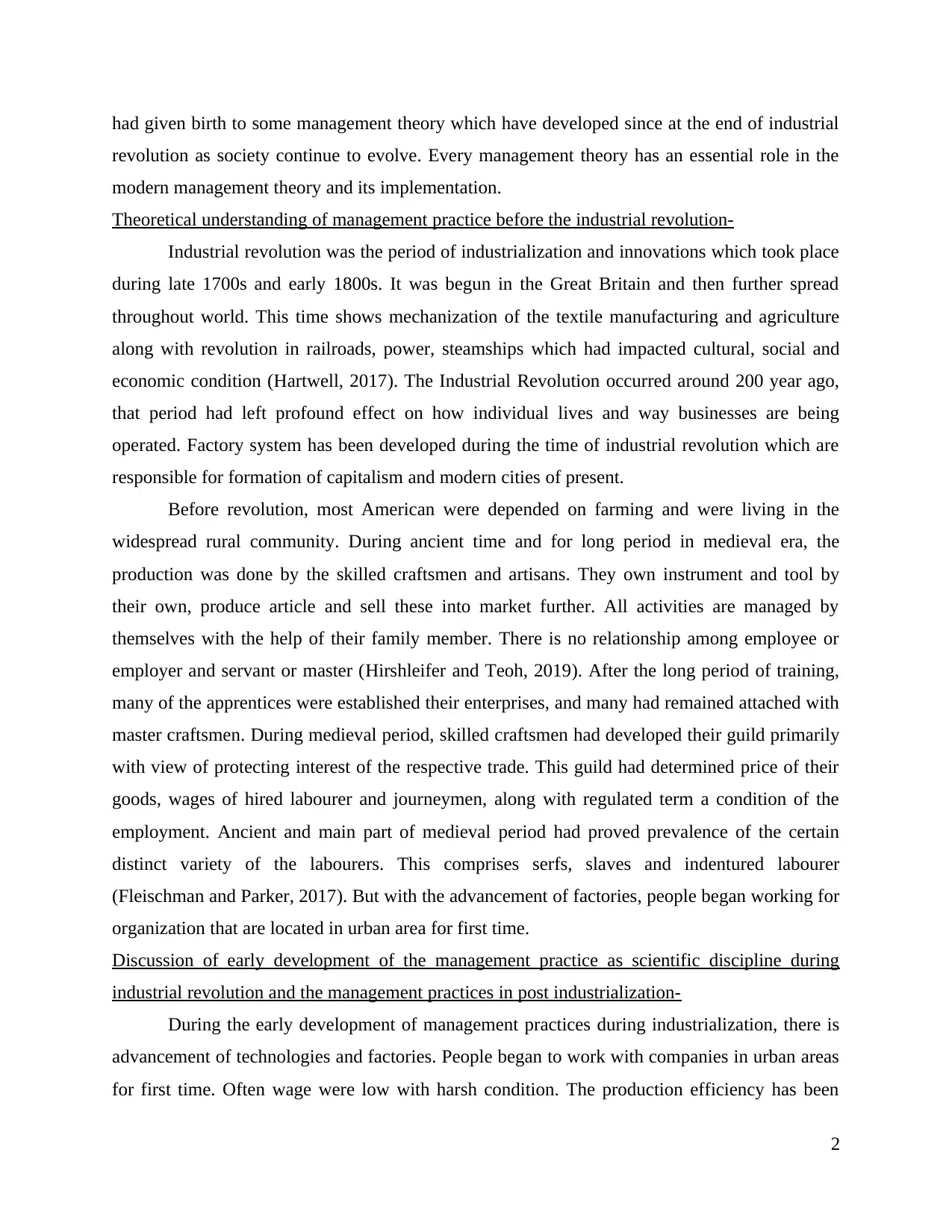
had given birth to some management theory which have developed since at the end of industrial
revolution as society continue to evolve. Every management theory has an essential role in the
modern management theory and its implementation.
Theoretical understanding of management practice before the industrial revolution-
Industrial revolution was the period of industrialization and innovations which took place
during late 1700s and early 1800s. It was begun in the Great Britain and then further spread
throughout world. This time shows mechanization of the textile manufacturing and agriculture
along with revolution in railroads, power, steamships which had impacted cultural, social and
economic condition (Hartwell, 2017). The Industrial Revolution occurred around 200 year ago,
that period had left profound effect on how individual lives and way businesses are being
operated. Factory system has been developed during the time of industrial revolution which are
responsible for formation of capitalism and modern cities of present.
Before revolution, most American were depended on farming and were living in the
widespread rural community. During ancient time and for long period in medieval era, the
production was done by the skilled craftsmen and artisans. They own instrument and tool by
their own, produce article and sell these into market further. All activities are managed by
themselves with the help of their family member. There is no relationship among employee or
employer and servant or master (Hirshleifer and Teoh, 2019). After the long period of training,
many of the apprentices were established their enterprises, and many had remained attached with
master craftsmen. During medieval period, skilled craftsmen had developed their guild primarily
with view of protecting interest of the respective trade. This guild had determined price of their
goods, wages of hired labourer and journeymen, along with regulated term a condition of the
employment. Ancient and main part of medieval period had proved prevalence of the certain
distinct variety of the labourers. This comprises serfs, slaves and indentured labourer
(Fleischman and Parker, 2017). But with the advancement of factories, people began working for
organization that are located in urban area for first time.
Discussion of early development of the management practice as scientific discipline during
industrial revolution and the management practices in post industrialization-
During the early development of management practices during industrialization, there is
advancement of technologies and factories. People began to work with companies in urban areas
for first time. Often wage were low with harsh condition. The production efficiency has been
2
revolution as society continue to evolve. Every management theory has an essential role in the
modern management theory and its implementation.
Theoretical understanding of management practice before the industrial revolution-
Industrial revolution was the period of industrialization and innovations which took place
during late 1700s and early 1800s. It was begun in the Great Britain and then further spread
throughout world. This time shows mechanization of the textile manufacturing and agriculture
along with revolution in railroads, power, steamships which had impacted cultural, social and
economic condition (Hartwell, 2017). The Industrial Revolution occurred around 200 year ago,
that period had left profound effect on how individual lives and way businesses are being
operated. Factory system has been developed during the time of industrial revolution which are
responsible for formation of capitalism and modern cities of present.
Before revolution, most American were depended on farming and were living in the
widespread rural community. During ancient time and for long period in medieval era, the
production was done by the skilled craftsmen and artisans. They own instrument and tool by
their own, produce article and sell these into market further. All activities are managed by
themselves with the help of their family member. There is no relationship among employee or
employer and servant or master (Hirshleifer and Teoh, 2019). After the long period of training,
many of the apprentices were established their enterprises, and many had remained attached with
master craftsmen. During medieval period, skilled craftsmen had developed their guild primarily
with view of protecting interest of the respective trade. This guild had determined price of their
goods, wages of hired labourer and journeymen, along with regulated term a condition of the
employment. Ancient and main part of medieval period had proved prevalence of the certain
distinct variety of the labourers. This comprises serfs, slaves and indentured labourer
(Fleischman and Parker, 2017). But with the advancement of factories, people began working for
organization that are located in urban area for first time.
Discussion of early development of the management practice as scientific discipline during
industrial revolution and the management practices in post industrialization-
During the early development of management practices during industrialization, there is
advancement of technologies and factories. People began to work with companies in urban areas
for first time. Often wage were low with harsh condition. The production efficiency has been
2
Paraphrase This Document
Need a fresh take? Get an instant paraphrase of this document with our AI Paraphraser
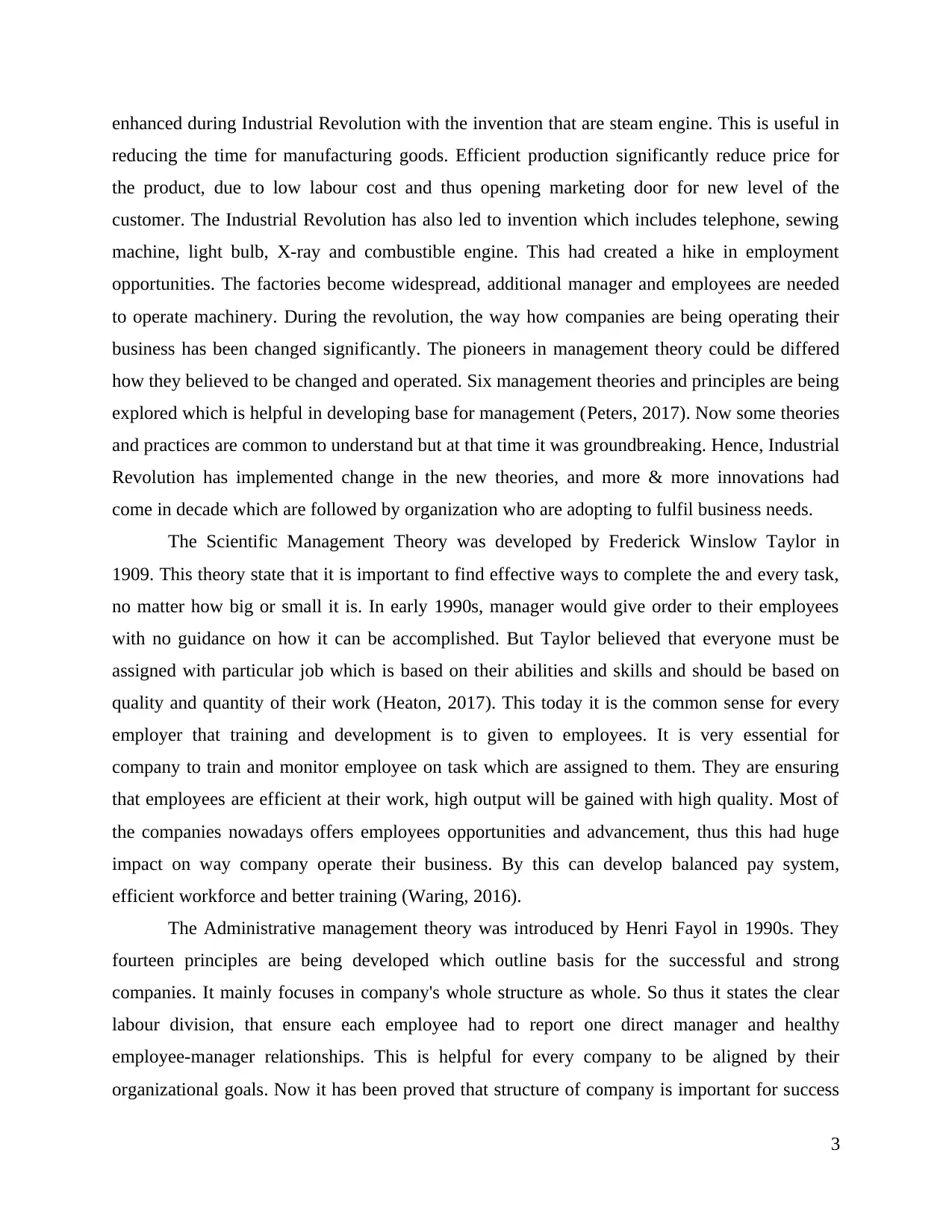
enhanced during Industrial Revolution with the invention that are steam engine. This is useful in
reducing the time for manufacturing goods. Efficient production significantly reduce price for
the product, due to low labour cost and thus opening marketing door for new level of the
customer. The Industrial Revolution has also led to invention which includes telephone, sewing
machine, light bulb, X-ray and combustible engine. This had created a hike in employment
opportunities. The factories become widespread, additional manager and employees are needed
to operate machinery. During the revolution, the way how companies are being operating their
business has been changed significantly. The pioneers in management theory could be differed
how they believed to be changed and operated. Six management theories and principles are being
explored which is helpful in developing base for management (Peters, 2017). Now some theories
and practices are common to understand but at that time it was groundbreaking. Hence, Industrial
Revolution has implemented change in the new theories, and more & more innovations had
come in decade which are followed by organization who are adopting to fulfil business needs.
The Scientific Management Theory was developed by Frederick Winslow Taylor in
1909. This theory state that it is important to find effective ways to complete the and every task,
no matter how big or small it is. In early 1990s, manager would give order to their employees
with no guidance on how it can be accomplished. But Taylor believed that everyone must be
assigned with particular job which is based on their abilities and skills and should be based on
quality and quantity of their work (Heaton, 2017). This today it is the common sense for every
employer that training and development is to given to employees. It is very essential for
company to train and monitor employee on task which are assigned to them. They are ensuring
that employees are efficient at their work, high output will be gained with high quality. Most of
the companies nowadays offers employees opportunities and advancement, thus this had huge
impact on way company operate their business. By this can develop balanced pay system,
efficient workforce and better training (Waring, 2016).
The Administrative management theory was introduced by Henri Fayol in 1990s. They
fourteen principles are being developed which outline basis for the successful and strong
companies. It mainly focuses in company's whole structure as whole. So thus it states the clear
labour division, that ensure each employee had to report one direct manager and healthy
employee-manager relationships. This is helpful for every company to be aligned by their
organizational goals. Now it has been proved that structure of company is important for success
3
reducing the time for manufacturing goods. Efficient production significantly reduce price for
the product, due to low labour cost and thus opening marketing door for new level of the
customer. The Industrial Revolution has also led to invention which includes telephone, sewing
machine, light bulb, X-ray and combustible engine. This had created a hike in employment
opportunities. The factories become widespread, additional manager and employees are needed
to operate machinery. During the revolution, the way how companies are being operating their
business has been changed significantly. The pioneers in management theory could be differed
how they believed to be changed and operated. Six management theories and principles are being
explored which is helpful in developing base for management (Peters, 2017). Now some theories
and practices are common to understand but at that time it was groundbreaking. Hence, Industrial
Revolution has implemented change in the new theories, and more & more innovations had
come in decade which are followed by organization who are adopting to fulfil business needs.
The Scientific Management Theory was developed by Frederick Winslow Taylor in
1909. This theory state that it is important to find effective ways to complete the and every task,
no matter how big or small it is. In early 1990s, manager would give order to their employees
with no guidance on how it can be accomplished. But Taylor believed that everyone must be
assigned with particular job which is based on their abilities and skills and should be based on
quality and quantity of their work (Heaton, 2017). This today it is the common sense for every
employer that training and development is to given to employees. It is very essential for
company to train and monitor employee on task which are assigned to them. They are ensuring
that employees are efficient at their work, high output will be gained with high quality. Most of
the companies nowadays offers employees opportunities and advancement, thus this had huge
impact on way company operate their business. By this can develop balanced pay system,
efficient workforce and better training (Waring, 2016).
The Administrative management theory was introduced by Henri Fayol in 1990s. They
fourteen principles are being developed which outline basis for the successful and strong
companies. It mainly focuses in company's whole structure as whole. So thus it states the clear
labour division, that ensure each employee had to report one direct manager and healthy
employee-manager relationships. This is helpful for every company to be aligned by their
organizational goals. Now it has been proved that structure of company is important for success
3
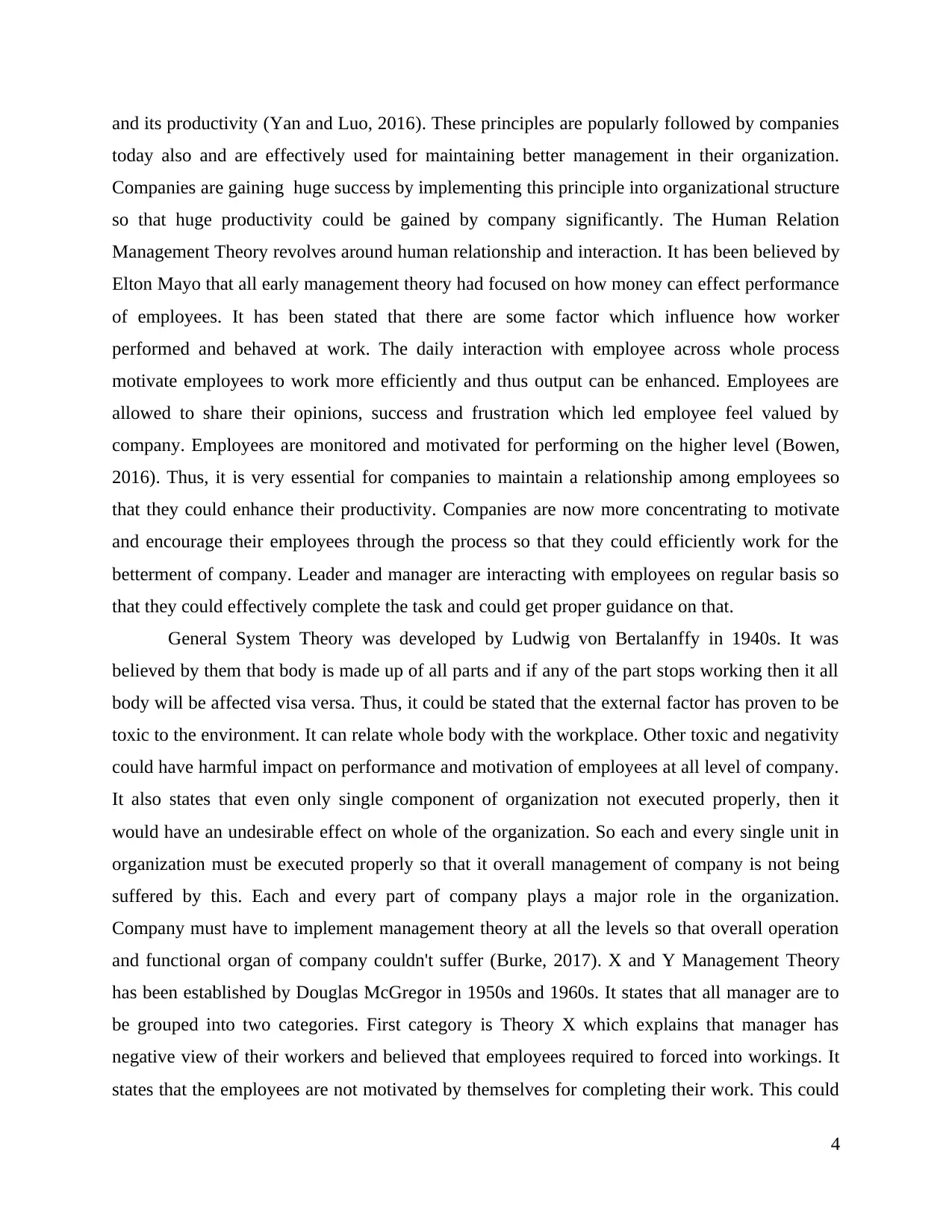
and its productivity (Yan and Luo, 2016). These principles are popularly followed by companies
today also and are effectively used for maintaining better management in their organization.
Companies are gaining huge success by implementing this principle into organizational structure
so that huge productivity could be gained by company significantly. The Human Relation
Management Theory revolves around human relationship and interaction. It has been believed by
Elton Mayo that all early management theory had focused on how money can effect performance
of employees. It has been stated that there are some factor which influence how worker
performed and behaved at work. The daily interaction with employee across whole process
motivate employees to work more efficiently and thus output can be enhanced. Employees are
allowed to share their opinions, success and frustration which led employee feel valued by
company. Employees are monitored and motivated for performing on the higher level (Bowen,
2016). Thus, it is very essential for companies to maintain a relationship among employees so
that they could enhance their productivity. Companies are now more concentrating to motivate
and encourage their employees through the process so that they could efficiently work for the
betterment of company. Leader and manager are interacting with employees on regular basis so
that they could effectively complete the task and could get proper guidance on that.
General System Theory was developed by Ludwig von Bertalanffy in 1940s. It was
believed by them that body is made up of all parts and if any of the part stops working then it all
body will be affected visa versa. Thus, it could be stated that the external factor has proven to be
toxic to the environment. It can relate whole body with the workplace. Other toxic and negativity
could have harmful impact on performance and motivation of employees at all level of company.
It also states that even only single component of organization not executed properly, then it
would have an undesirable effect on whole of the organization. So each and every single unit in
organization must be executed properly so that it overall management of company is not being
suffered by this. Each and every part of company plays a major role in the organization.
Company must have to implement management theory at all the levels so that overall operation
and functional organ of company couldn't suffer (Burke, 2017). X and Y Management Theory
has been established by Douglas McGregor in 1950s and 1960s. It states that all manager are to
be grouped into two categories. First category is Theory X which explains that manager has
negative view of their workers and believed that employees required to forced into workings. It
states that the employees are not motivated by themselves for completing their work. This could
4
today also and are effectively used for maintaining better management in their organization.
Companies are gaining huge success by implementing this principle into organizational structure
so that huge productivity could be gained by company significantly. The Human Relation
Management Theory revolves around human relationship and interaction. It has been believed by
Elton Mayo that all early management theory had focused on how money can effect performance
of employees. It has been stated that there are some factor which influence how worker
performed and behaved at work. The daily interaction with employee across whole process
motivate employees to work more efficiently and thus output can be enhanced. Employees are
allowed to share their opinions, success and frustration which led employee feel valued by
company. Employees are monitored and motivated for performing on the higher level (Bowen,
2016). Thus, it is very essential for companies to maintain a relationship among employees so
that they could enhance their productivity. Companies are now more concentrating to motivate
and encourage their employees through the process so that they could efficiently work for the
betterment of company. Leader and manager are interacting with employees on regular basis so
that they could effectively complete the task and could get proper guidance on that.
General System Theory was developed by Ludwig von Bertalanffy in 1940s. It was
believed by them that body is made up of all parts and if any of the part stops working then it all
body will be affected visa versa. Thus, it could be stated that the external factor has proven to be
toxic to the environment. It can relate whole body with the workplace. Other toxic and negativity
could have harmful impact on performance and motivation of employees at all level of company.
It also states that even only single component of organization not executed properly, then it
would have an undesirable effect on whole of the organization. So each and every single unit in
organization must be executed properly so that it overall management of company is not being
suffered by this. Each and every part of company plays a major role in the organization.
Company must have to implement management theory at all the levels so that overall operation
and functional organ of company couldn't suffer (Burke, 2017). X and Y Management Theory
has been established by Douglas McGregor in 1950s and 1960s. It states that all manager are to
be grouped into two categories. First category is Theory X which explains that manager has
negative view of their workers and believed that employees required to forced into workings. It
states that the employees are not motivated by themselves for completing their work. This could
4
⊘ This is a preview!⊘
Do you want full access?
Subscribe today to unlock all pages.

Trusted by 1+ million students worldwide
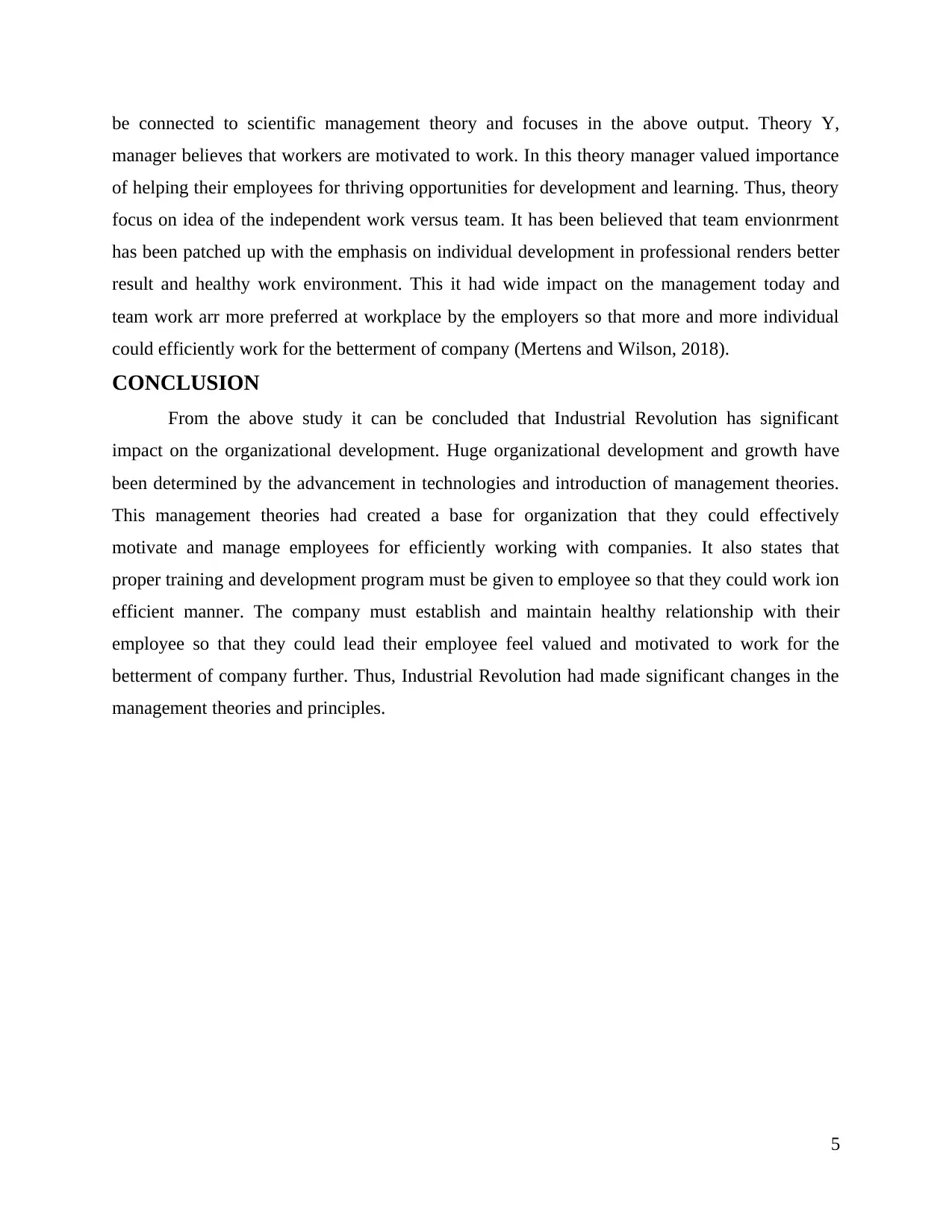
be connected to scientific management theory and focuses in the above output. Theory Y,
manager believes that workers are motivated to work. In this theory manager valued importance
of helping their employees for thriving opportunities for development and learning. Thus, theory
focus on idea of the independent work versus team. It has been believed that team envionrment
has been patched up with the emphasis on individual development in professional renders better
result and healthy work environment. This it had wide impact on the management today and
team work arr more preferred at workplace by the employers so that more and more individual
could efficiently work for the betterment of company (Mertens and Wilson, 2018).
CONCLUSION
From the above study it can be concluded that Industrial Revolution has significant
impact on the organizational development. Huge organizational development and growth have
been determined by the advancement in technologies and introduction of management theories.
This management theories had created a base for organization that they could effectively
motivate and manage employees for efficiently working with companies. It also states that
proper training and development program must be given to employee so that they could work ion
efficient manner. The company must establish and maintain healthy relationship with their
employee so that they could lead their employee feel valued and motivated to work for the
betterment of company further. Thus, Industrial Revolution had made significant changes in the
management theories and principles.
5
manager believes that workers are motivated to work. In this theory manager valued importance
of helping their employees for thriving opportunities for development and learning. Thus, theory
focus on idea of the independent work versus team. It has been believed that team envionrment
has been patched up with the emphasis on individual development in professional renders better
result and healthy work environment. This it had wide impact on the management today and
team work arr more preferred at workplace by the employers so that more and more individual
could efficiently work for the betterment of company (Mertens and Wilson, 2018).
CONCLUSION
From the above study it can be concluded that Industrial Revolution has significant
impact on the organizational development. Huge organizational development and growth have
been determined by the advancement in technologies and introduction of management theories.
This management theories had created a base for organization that they could effectively
motivate and manage employees for efficiently working with companies. It also states that
proper training and development program must be given to employee so that they could work ion
efficient manner. The company must establish and maintain healthy relationship with their
employee so that they could lead their employee feel valued and motivated to work for the
betterment of company further. Thus, Industrial Revolution had made significant changes in the
management theories and principles.
5
Paraphrase This Document
Need a fresh take? Get an instant paraphrase of this document with our AI Paraphraser
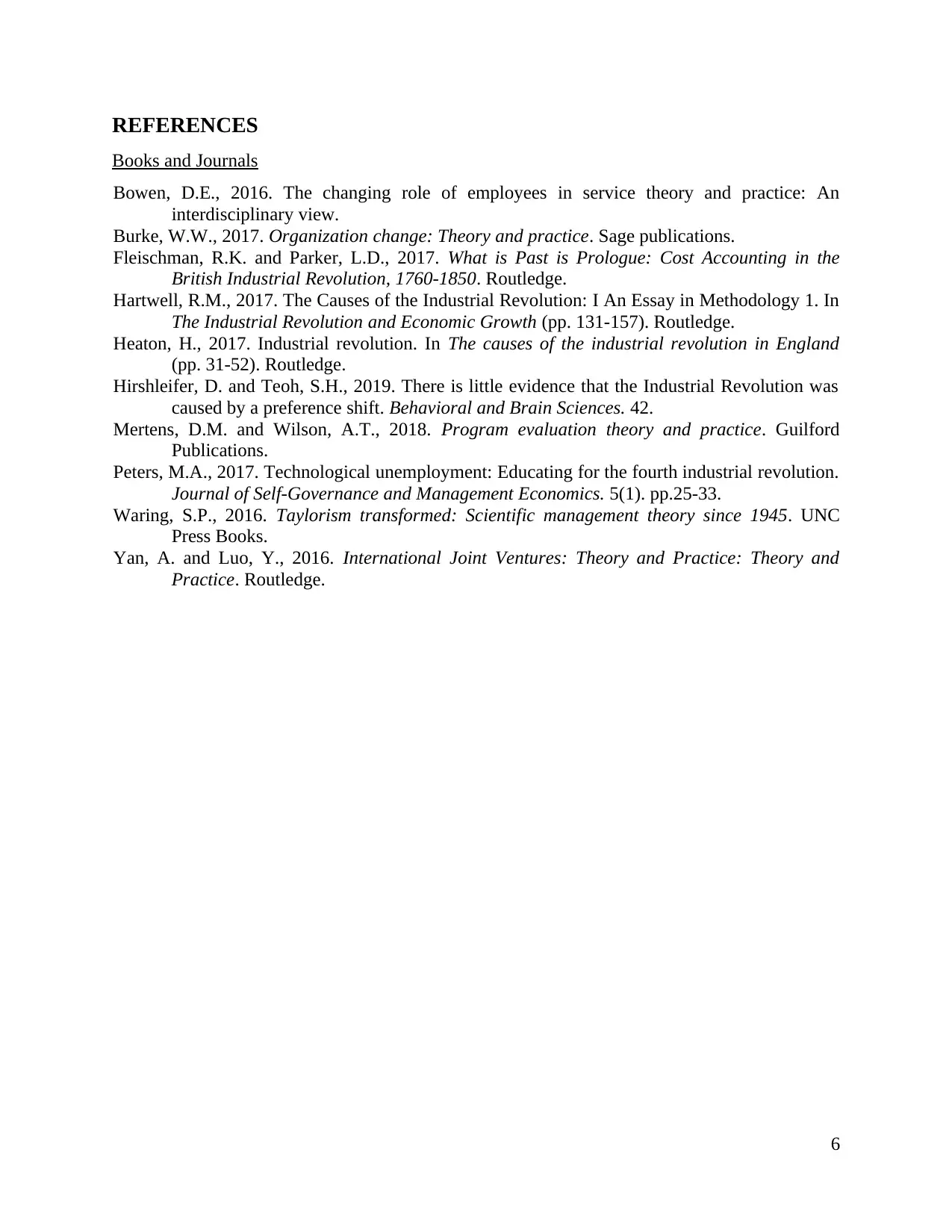
REFERENCES
Books and Journals
Bowen, D.E., 2016. The changing role of employees in service theory and practice: An
interdisciplinary view.
Burke, W.W., 2017. Organization change: Theory and practice. Sage publications.
Fleischman, R.K. and Parker, L.D., 2017. What is Past is Prologue: Cost Accounting in the
British Industrial Revolution, 1760-1850. Routledge.
Hartwell, R.M., 2017. The Causes of the Industrial Revolution: I An Essay in Methodology 1. In
The Industrial Revolution and Economic Growth (pp. 131-157). Routledge.
Heaton, H., 2017. Industrial revolution. In The causes of the industrial revolution in England
(pp. 31-52). Routledge.
Hirshleifer, D. and Teoh, S.H., 2019. There is little evidence that the Industrial Revolution was
caused by a preference shift. Behavioral and Brain Sciences. 42.
Mertens, D.M. and Wilson, A.T., 2018. Program evaluation theory and practice. Guilford
Publications.
Peters, M.A., 2017. Technological unemployment: Educating for the fourth industrial revolution.
Journal of Self-Governance and Management Economics. 5(1). pp.25-33.
Waring, S.P., 2016. Taylorism transformed: Scientific management theory since 1945. UNC
Press Books.
Yan, A. and Luo, Y., 2016. International Joint Ventures: Theory and Practice: Theory and
Practice. Routledge.
6
Books and Journals
Bowen, D.E., 2016. The changing role of employees in service theory and practice: An
interdisciplinary view.
Burke, W.W., 2017. Organization change: Theory and practice. Sage publications.
Fleischman, R.K. and Parker, L.D., 2017. What is Past is Prologue: Cost Accounting in the
British Industrial Revolution, 1760-1850. Routledge.
Hartwell, R.M., 2017. The Causes of the Industrial Revolution: I An Essay in Methodology 1. In
The Industrial Revolution and Economic Growth (pp. 131-157). Routledge.
Heaton, H., 2017. Industrial revolution. In The causes of the industrial revolution in England
(pp. 31-52). Routledge.
Hirshleifer, D. and Teoh, S.H., 2019. There is little evidence that the Industrial Revolution was
caused by a preference shift. Behavioral and Brain Sciences. 42.
Mertens, D.M. and Wilson, A.T., 2018. Program evaluation theory and practice. Guilford
Publications.
Peters, M.A., 2017. Technological unemployment: Educating for the fourth industrial revolution.
Journal of Self-Governance and Management Economics. 5(1). pp.25-33.
Waring, S.P., 2016. Taylorism transformed: Scientific management theory since 1945. UNC
Press Books.
Yan, A. and Luo, Y., 2016. International Joint Ventures: Theory and Practice: Theory and
Practice. Routledge.
6
1 out of 8
Related Documents
Your All-in-One AI-Powered Toolkit for Academic Success.
+13062052269
info@desklib.com
Available 24*7 on WhatsApp / Email
![[object Object]](/_next/static/media/star-bottom.7253800d.svg)
Unlock your academic potential
Copyright © 2020–2026 A2Z Services. All Rights Reserved. Developed and managed by ZUCOL.





